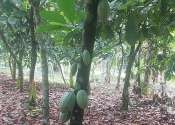Survival of the newest: The mammals that survive mass extinctions aren't as 'boring' as scientists thought
When an asteroid hit the Earth 66 million years ago, it set off a devastating mass extinction. The dinosaurs (except for a few birds) all died out, along with lots of the mammals. But some small mammals survived, laying the ...








